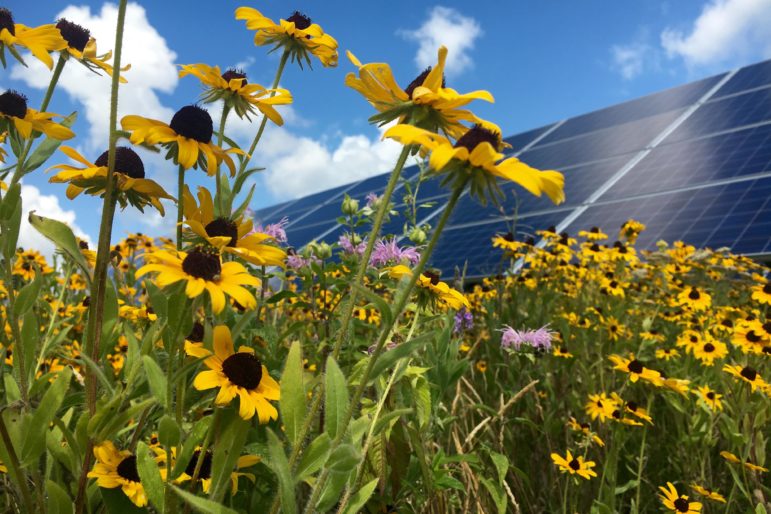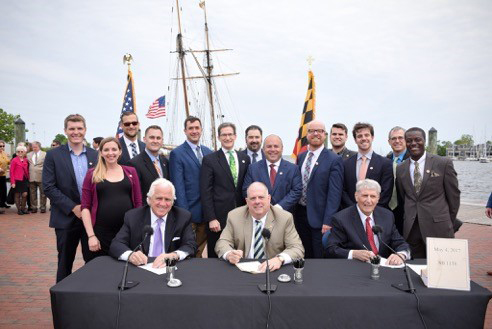
Solar is blooming in Minnesota—and as ground-mounted solar sites spring up around the state, most include an important feature: pollinator habitat.
A vital opportunity to create habitat
Bees, monarchs, and other critical pollinators are disappearing, and scientists agree that loss of habitat is a primary concern. With more than 4,500 acres of ground-mounted solar in process or slated for development, Minnesota has an opportunity to establish habitat equivalent to more than 2.5 million homes each having a six-foot-by-twelve-foot backyard pollinator garden.
Because U.S. solar industry first took off in the desert Southwest, a standard practice for the land on solar sites is gravel and/or monocrop lawn grass. That changed in 2016 when Fresh Energy, Audubon Minnesota, and the Minnesota Corn Growers worked with agricultural and business leaders to establish the nation’s first statewide standard for vegetation on solar sites.
The United Kingdom has had long and well-documented success using pollinator habitat on solar sites, with proven reductions in operations and management costs compared to mowing turfgrass and increases in abundance of bees and other insects needed to pollinate crops
Minnesota: a national leader
This spring, multiple Minnesota solar sites are being planted with black-eyed susans, purple prairie clover, partridge pea, butterfly weed, and more plants selected specially for our climate and pollinator value.
As reported by Solar Power World, integrity and standards like the one established in Minnesota are critical when promoting solar site vegetation as beneficial to pollinators. Too often we see arbitrary labels that mislead consumers. Thanks to the policy secured by Fresh Energy, Audubon, Minnesota Corn Growers Association, and diverse state interests, we will not face arbitrary standards here.
“We’re not talking about just a narrow row of native vegetation by the front gate that makes it look like a project is pollinator-friendly,” said SoCore Energy’s Laura Caspari. “Just putting a row of pretty plants along the front fence doesn’t achieve that. That’s why the Minnesota standard is so important, because it provides a benchmark.”
Maryland replicates Minnesota’s standard
Minnesota’s standard has generated interest in states throughout the country, and Fresh Energy played a key role helping the state of Maryland secure a similar policy.
In the final hours of a legislative session that included more than 3,000 bills, Maryland Delegate Dereck Davis accurately summarized SB 1158, a bill establishing a statewide standard for pollinator-friendly solar:
The bill went on to pass unanimously and was signed into law by Republican Governor Larry Hogan on May 4, 2017.

Originally introduced by Senators Middleton (D, Charles County) and Jennings (R, Baltimore and Harford County) SB 1158, establishes a standard for pollinator-friendly solar in Maryland. A member of Senate leadership, Senator Middleton is chair of the Finance Committee and is also owner/operator of Cedar Hill Farm near Waldorf, MD. Senator Jennings is the Republican minority leader, dairy farmer, and previously owned a farm seed business.
During the legislative process, SB 1158 was endorsed by the Maryland Farm Bureau, Homestead Gardens, Lower Eastern Shore Beekeepers Association, Maryland Grain Producers Association, the Maryland Association of Soil Conservation Districts, Delmarva Poultry Industry, American Native Plants, GreenVest Ecological Services, Eastern Shore Land Conservancy, and others.
Spreading the word
Fresh Energy and Audubon will be continuing to engage with states around the country interested in securing their own pollinator-friendly solar definition. As four prominent Maryland agriculture and conservation leaders wrote in GreenBiz:
Vetted by several of the nation’s top entomologists, these standards play an important role in making sure that when a site is promoted as beneficial to pollinators, that it delivers on those commitments.
Fresh Energy’s Rob Davis (don’t call him the bee man) has been leading pollinator work throughout the country, connecting with news outlets across the country. A two-time speaker at Verge, Rob will be presenting lessons learned and answering questions on a Fresh Energy webinar on June 22, 2017 during National Pollinator Week.
